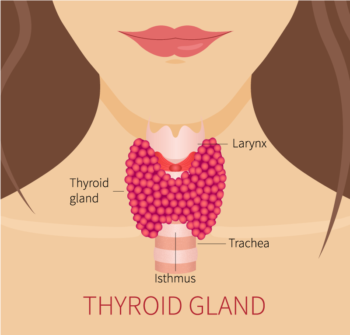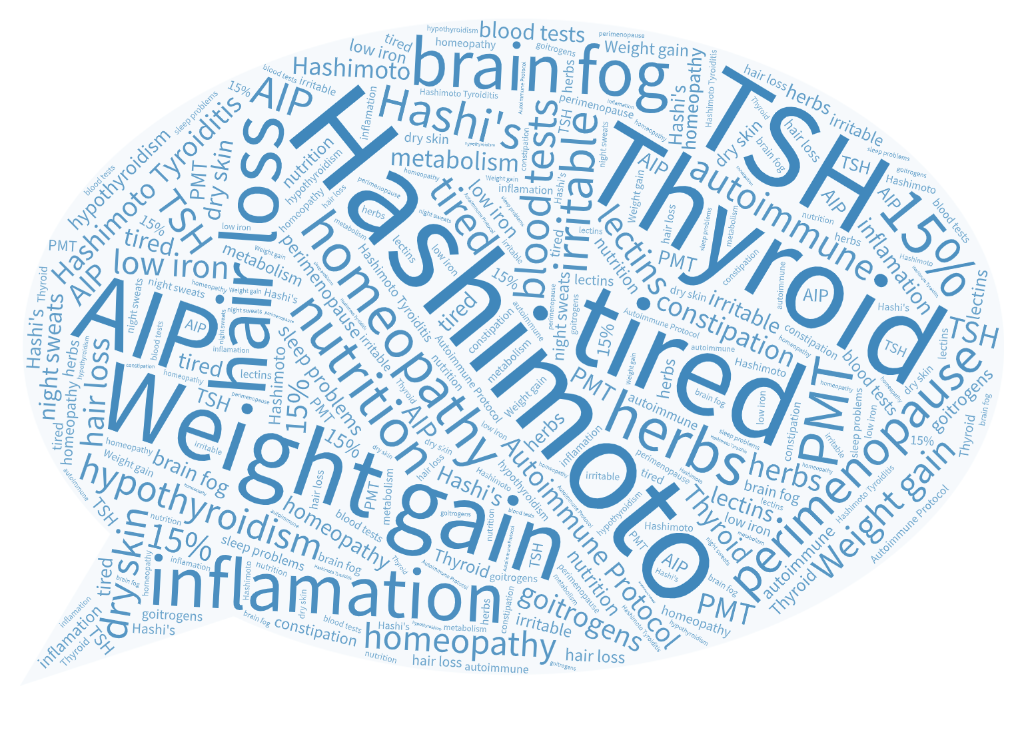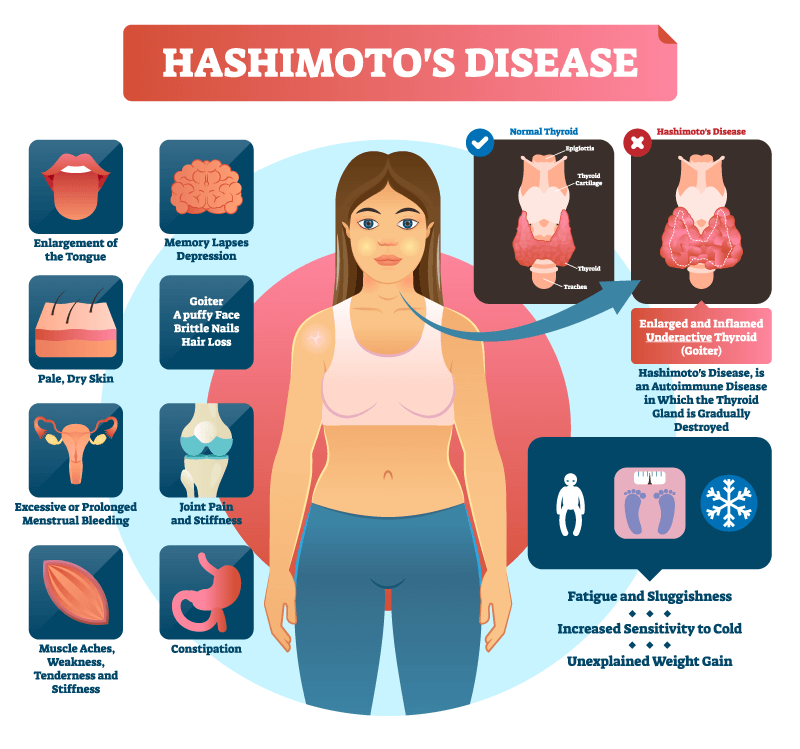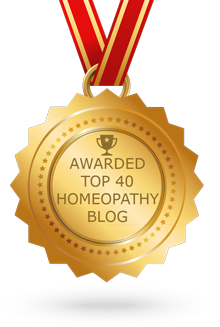The silent epidemic of Hashimoto Thyroiditis
Symptoms of perimenopause
Most women I know have had issues going through perimenopause, but there are a smug few who don’t get any symptoms. They’re the ones who sail through their journey with relative ease, don’t even put on a kilo, and don’t even raise a sweat. That wasn’t me.
You might be thinking, but Penny is a natural therapist, so surely, she has all the answers to be able to sort herself out. I may have learned a thing or two, but health is super complex and very individualised and it’s a bit of a journey to find the right path to go down.
So, when I started feeling very low, tired, irritable and watching my weight creep slowly up and up no matter what I did, I really started to resent the entire perimenopausal process and being born female. Surely, having had to go through menstruating my entire life, giving birth to 3 children and navigating work and parenting and all the stresses that come from that, it’s now time for me to get a break.
Add to that a lot of early and midlife trauma, as well as various low grade intolerances not identified for years and years, and you have the perfect storm for autoimmune disease to happen.
In late January 2023 I decided that enough was enough. For too long, I’d been battling all the usual perimenopausal stuff – exhaustion, brain fog, insomnia, weight gain, thinning hair, muscle aches and increasingly horrible PMS/PMT and periods.
I would have to say I’m the worst patient ever since I just pushed through it all and did what I thought should help. After all, I was super busy, and finances were tight. I also couldn’t quite say when it all started, although the many stresses I’d been through in my life combined with getting covid twice (my hair started falling out after that), meant that there were a few things contributing to it all.
Weight gain – Is keto the right diet for Hashimoto?
I tried a few things to get the weight under control. Intermittent fasting was a bit of a disaster, leading to me just feeling foggy headed and hangry. I didn’t lose a gram and the stress of it was enough to make me quit (stress is very bad for those of us going through this stage). I supported my moods and adrenals with all these wonderful homeopathic remedies, foods and herbs as well as working on my digestion including stomach acid and avoiding gluten like the plague. The weight didn’t budge. I started walking seven days a week instead of four or five, and I walked longer. I carb-cycled and interval-trained and then lowered my carbs as much as I could. The weight just kept on creeping.
It wasn’t until I started on my paleo/keto jaunt that things really started getting bad, and I put on five kilos in about 3 months. You, like me back then, might be thinking stuff along the lines of, but what’s going on there? Isn’t Keto/paleo supposed to be the best diet ever in the whole universe for losing weight and getting the metabolism cranking?
Um… sometimes, but certain people should stay right away from certain paleo/keto foods, especially the high protein non-meat foods like nuts, seeds, legumes (like tofu and lentils) and grains as well as dairy, because they contain these substances called lectins. These are naturally occurring chemicals in plants that can cause a lot of inflammation and block absorption of nutrients.
Thyroid ranges
Having been to the doctor a few times to check out what was on offer there, I left each time feeling very disappointed. My clients often say the same thing. The blood tests usually suggested by the doc (which are available through Medicare) are very basic and there’s not much chance of them revealing much. I knew that if I went to the doc it would be likely that the basic results would be in all the normal ranges, especially for TSH (Thyroid Stimulating Hormone which is one of the ones they will measure but not all the others that can give more information about what is wrong).
One of my perimenopausal clients told me recently about a visit to the doctor for similar symptoms (she saw a male doc in his early 30’s). The doctor apparently looked at her with a liberal serve of patronising sympathy and offered her antidepressants. It’s a story I’ve heard way too many times before and will often be one of the last straws for someone looking for deeper answers. My last straw was the 2kg I put on over the Christmas break and feeling like I’d been run over by a truck despite the nice relaxing time I’d had.
I was also inspired by a course I completed recently in how to more effectively read blood pathology tests, as well as the software to help read it. That was such an amazing explosion of empowering knowledge it totally excited my nerdy brain despite how tired and foggy it felt.
Rather than continuing the process of despair and powerlessness while watching the train wreck in slow motion, I decided to take the bull by the horns. Once I make a decision, I want it to happen straight away, so I impulsively ordered $400 worth of blood tests independent of the medical establishment. You’re probably better off going to the doc and asking for whatever tests you feel are appropriate, then paying the gap, as you will still get some through Medicare if you go through the doctor. Plus, your doctor might have some other suggestions if they know you’re willing to shell out for the extras not covered by Medicare.
What is Hashimoto Thyroiditis?

What I found in my blood tests was a revelation. It turns out I have thyroid antibodies consistent with Hashimoto thyroiditis. For those unfamiliar with this condition, it happens when a person’s immune system starts to attack the thyroid gland. The thyroid gland dictates the speed of our metabolism, so when it gets attacked in this way it causes the metabolism to slow right down. Many symptoms of Hashimoto thyroiditis (or Hashi’s for short), look a lot like perimenopause and
menopause.
Hashi’s can also happen more commonly around the perimenopause journey because hormones like especially progesterone (oestrogen’s role is a lot more complicated) are protective against these issues. During perimenopause those hormones begin to go all over the shop, but ultimately, they reduce, leading to increased risk of inflammatory conditions and autoimmune stuff. In fact, one of the most common organs to be affected in perimenopause is the thyroid gland.
Here are some of the more common symptoms of Hashi’s, which do really look a lot like perimenopause:
- Feeling tired and irritable
- Brain fog
- Weight gain
- Thinning hair
- Swelling of ankles and other tissues
- Sleep problems
- Constipation
- Cold and heat intolerance
- Night sweats
- Eyebrow thinning
- Dry skin
- Muscle aches and tenderness
- Weakness
- Heavy periods
- Low iron
Feeling empowered by my diagnosis
Strangely enough, while I found myself in a mild state of shock at the discovery, I actually felt a bit thrilled that I now have a reason for everything that has been happening to me. Not because I won’t be able to eat out with friends for a while and have to go on this restrictive diet, but because I felt empowered to be able to do something about it. So, down the autoimmune rabbit hole I went.
Did you know that statistics say around 15% of women in various stages of menopause actually have a thyroid disorder? Let me put that in shouty capitals. 15% OF WOMEN THINKING THEY ARE JUST GOING THROUGH MENOPAUSE ACTUALLY HAVE A THYROID DISORDER BUT I RECKON IT’S WAAAY MORE THAN 15%!!!! The reason why I reckon this is only the tip of the iceberg is because hypothyroid conditions are notoriously difficult to get a diagnosis for. This means that the actual reality of the situation is likely to be much, much higher than 15%. I want to know, why is this not splashed all over the mainstream media?
Unfortunately, talking about the mainstream set up, they don’t really have a lot to offer for Hashimoto thyroiditis aside from thyroxine to fill the gap left by the poor, tired thyroid gland which stops being able to produce enough thyroid hormone to drive healthy metabolism. When the thyroid gland is running slow, the upper management steps in (the anterior pituitary gland) and increases its secretion of Thyroid Stimulating Hormone or TSH. The role of TSH is to tell the thyroid gland to up its game and increase production of thyroid hormone. This is how you may discover that you have a slow running thyroid – by the TSH reading being higher than normal. Unfortunately, though, the TSH will stay in the normal range for a very long time before it shows any big changes. In that time, a lot of damage can happen behind the scenes. This is where detailed blood tests with a full thyroid panel are really important to show exactly what is going on if you have symptoms but no noticeable change in TSH.
So, what will I change now that I know what’s going on in my body? The answer is a lot. I have done a remedy search in my homeopathic repertory specific to hypothyroidism, coming up with a different remedy to my usual one that wasn’t as effective lately. I’m already starting to feel clearer and have more energy already on that! I have also been researching the best diet for my condition, which is the Autoimmune Protocol diet.
The Autoimmune Protocol (AIP for short)
The AIP diet is designed to minimise the inflammation a person is sensitive to when they have any kind of autoimmune disease. This inflammation especially affects the delicate lining of the gastrointestinal tract. We can’t exactly breathe air while we are waiting for our poor damaged guts to heal, so we need to be able to eat a diet that allows us to minimise damage while maximising nutrients. This is what the AIP diet aims to do.
In my extensive internet searching over the last little while (you might say obsessive), I’ve found this awesome resource on which foods are in or out of the AIP. Just be mindful to ensure that if you are also faced with hashi’s, cook all brassica veggies (for example turnips, radishes, kale, cabbage, cauliflower, broccoli, and brussel sprouts) because they contain goitrogens which block the uptake of iodine by the thyroid and can slow it down further.
mindful to ensure that if you are also faced with hashi’s, cook all brassica veggies (for example turnips, radishes, kale, cabbage, cauliflower, broccoli, and brussel sprouts) because they contain goitrogens which block the uptake of iodine by the thyroid and can slow it down further.
Just to inspire myself to take the plunge, I have recently read that over 70% of people with Hashimoto experience remission if they follow the AIP diet, so I’m feeling hopeful that I’ll be among those who do. I’m also going to be using homeopathic remedies as well as herbs and supplements to make sure I give myself and my thyroid the best possible chance of beating this thing. Over the next few weeks, I’ll be writing about my journey and what I experience on the way, so feel free to keep me company as I go. You can follow my journey HERE.
- The importance of Muscle Mass in menopause - 12/03/2025
- Penny’s gluten free bread recipe - 14/10/2024
- Children and bedwetting: What can parents do to help? - 01/10/2024



